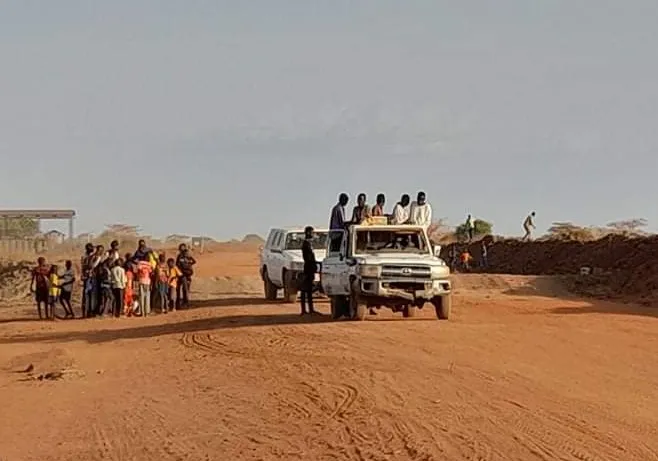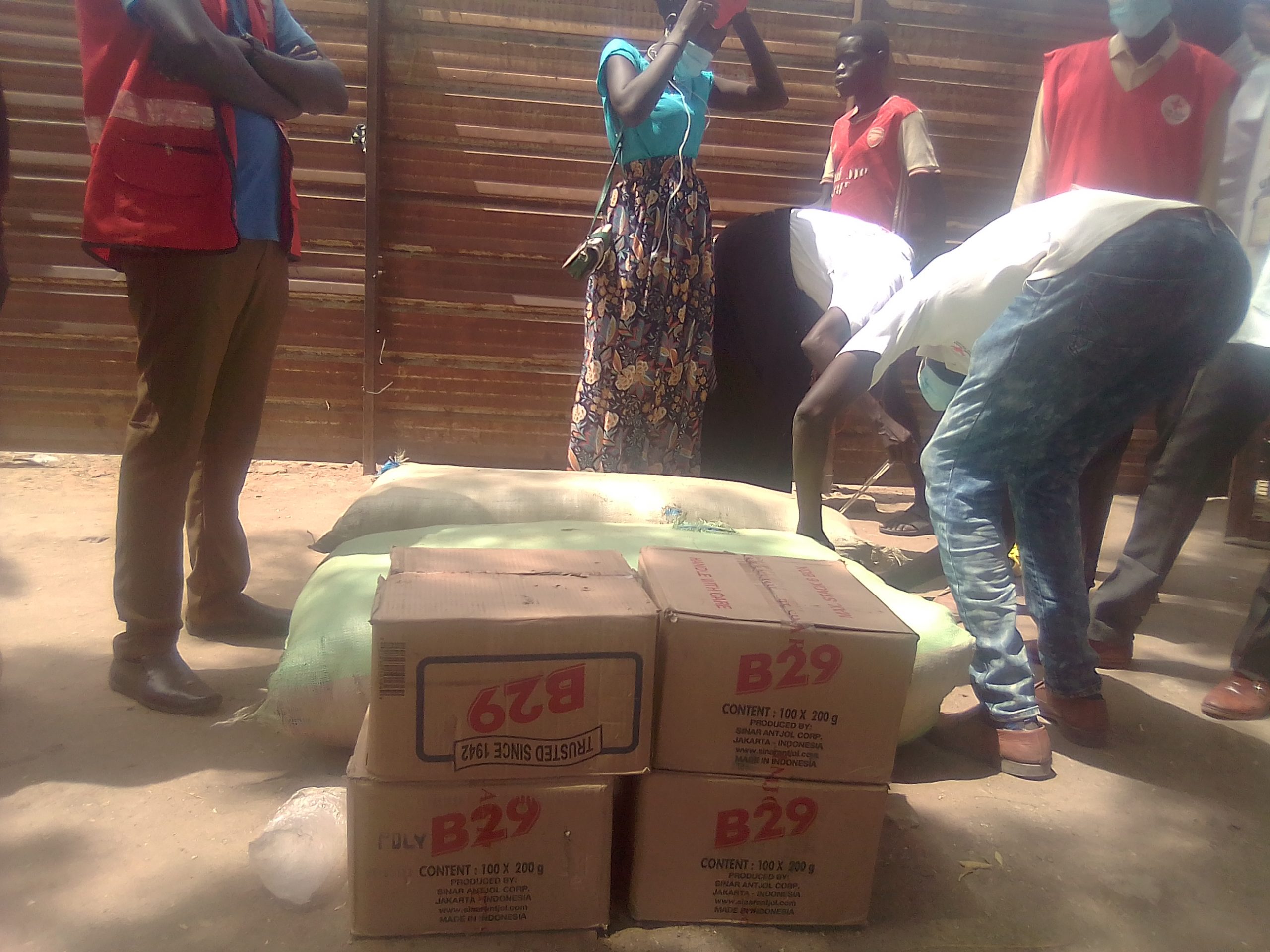
Addressing spike of child malnutrition due to worsening food insecurity

Children in Melut County, Upper Nile State, continued to suffer from shocking levels of malnutrition due to worsening food insecurity and economic destabilization in South Sudan.
Ayen, 1.5 years old was taken to Melut Hospital as a matter of urgency. Her mother, Sarah Chol says. “Ayen was very weak, and she lost some weight before I brought her to the hospital. Thanks to the team of nurses,” said Ayen’s mother.
According to Health Officials in Meluth, Ayen is one of more than 788 children, mostly less than five years old, suffering from severe acute malnutrition in Melut County. She is receiving treatment at Meluth health centre, which is supported by R2G (spell this out and then explain briefly what this is and how it is implemented) The 20-year-old mother testified that the therapeutic food packets restored her daughter’s strength and vitality.
Next to baby Ayen, we met one-year-old baby Mayen. He has been vomiting and has had diarrhea for the past few days. According to the nurses, at the time he was being admitted to Diingtma Primary Healthcare Unit he weighed only 4.6kg which is too little for under five year old.
“It started with diarrhea and vomiting and he immediately lost weight. I took him to the hospital and he was hospitalized for six months,” said, Mayen’s mother.
Mayen’s mother live in IDP camp which is hosting more than 43,000 internally displaced people. They were displaced from Pigi County of Jonglei State, Baliet and Panyikang Counties of Upper Nile State since mid-August 2022 following deadly fighting between armed forces.
Another child 1-year old Mary* is also admitted because of malnourishment joined other babies admitted to Diingtoma PHCU. Every day, the PHCU receives between 20 and 30 cases of children under five years old with severe acute malnutrition. Sunday has undergone a number of tests, is treated for a bacterial infection, given the therapeutic dietary bags.
“She fell sick and I brought her to the hospital here and she was given Therapeutic Food which is to be taken for a duration of 14 days,” said Sunday’s mother, (insert her name here and be sure to change it).
She said after only a couple of months of visiting the treatment centre, Sunday is now happy, healthy and playful.
“Her condition has improved not like before when I first brought her here. She is not healthy,” she said while adding that “In April, her weight was 12kg but now it has reduced again to 11kg due to lack of proper food to eat. We find it difficult to feed our children; we only survive if we plant vegetables to feed our children. It’s a worse situation.” said Sunday’s mother”.
Nyok Thon Kun is Outpatient Therapeutic Feeding Program (OTP) Nutrition Assistance at Diingtma PHCU. He said, they receive 20 to 30 cases of malnutrition every day.
He said they are treating severe wasting in children under 5 years old with Plumpy’nut.
“Until now, we have received like 39 children with severe actuate malnutrition cases. Some take like two months to recover which is four visits,” said Thon.
“We are staying because the supplies are finished in the store here and, we are receiving many cases per day. We have a gap and we are sending women with their children home because we don’t have enough supply.”
Dr. Ajang Deng, Director of the Melut County Department of Health said the County Department of Health works with partners to provide malnutrition services to children and women.
“Currently, we have a partners. They are providing nutrition services to the kids and pregnant women. According to data we have, monthly, Melut Hospital alone can be able to receive around 50 to 80 acute malnutrition cases, even pregnant women”, said Deng.
An estimated 1.4 million children under the age of five are malnourished in South Sudan, according to the recent Integrated Food Security Classification Report (IPC). Violence, displacement and food shortages are the main causes of escalating malnutrition rates and the growing number of children in Melut County. Melut Hospital provided treatment to more than 788 malnourished children in 2022 and 2023 respectively.

Mothers with malnourish at Melut Hospital in Melut County of Upper Niles State on 1ST June 2023 [Photo: Awan Achiek]
Ruon Kuany Kuol, Supportive Nutrition Assistant at Melut Hospital, said they have treated more than 1,220 malnourish children between 2022 2023. Ruon Kuany Kuol, Supportive Nutrition Assistant at Melut Hospital, said in 2022 they treated 214 female and 318 male and in 2023 they treated 262 male and 426 female.
“We admitted them and gave them BP-5 plus a corn soybean (CSB) blend, RUTF (Ready-to-use therapeutic food) known as Plumpy Nut, and RUSF (Ready-to-use Supplementary Food),” said Kuany.
Mr. Kuany said Melut hospital receives between 15 and 10 malnutrition cases a day at Melut Hospital. He said they treat malnourished children with amoxicillin, Plumpy’Sup, Plumpy’nut, and Pregnant and lactating women with a Corn soy blend (CSB) and BP-5 and it takes three months for a child to fully recover.
He called on the more support to set up a stabilisation centre, also known as the Therapeutic Nutritional Unit in Melut to help children under the age of five suffering from medical complications following severe malnutrition.
Malnutrition in children is harmful. Malnutrition during a child’s first two years of life damages physical and cognitive development and is sadly irreversible. A malnourished child has on average a seven-month delay in starting school and potentially a nearly 20 percent reduction in lifetime earnings. Adults who were undernourished as children are at risk of developing diseases such as obesity, diabetes and cardiovascular issues.
Right2Grow is being implemented by Save the Children and 7 other developmental and humanitarian organizations comprising of four national NGOs (CIDO, UNIDOR, SPEDP and CRC) and three international NGOs (World Vision, Action Against Hunger and CEGAA). The purpose is to enable all children under 5 are well nourished to contribute to the growth and development of children in South Sudan and allow them to reach their full potential. Also decision makers jointly and effectively address undernutrition in a multi-sectorial, gender-sensitive and inclusive way.




































